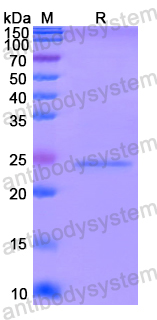Catalog No.
YHK69801
Expression system
E. coli
Species
Homo sapiens (Human)
Protein length
Ala728-Lys813
Predicted molecular weight
23.33 kDa
Nature
Recombinant
Endotoxin level
Please contact with the lab for this information.
Purity
>90% as determined by SDS-PAGE.
Accession
Q9UPZ3
Applications
ELISA, Immunogen, SDS-PAGE, WB, Bioactivity testing in progress
Form
Lyophilized
Storage buffer
Lyophilized from a solution in PBS pH 7.4, 0.02% NLS, 1mM EDTA, 4% Trehalose, 1% Mannitol.
Reconstitution
Reconstitute in sterile water for a stock solution. A copy of datasheet will be provided with the products, please refer to it for details.
Shipping
In general, proteins are provided as lyophilized powder/frozen liquid. They are shipped out with dry ice/blue ice unless customers require otherwise.
Stability and Storage
Use a manual defrost freezer and avoid repeated freeze thaw cycles. Store at 2 to 8°C for frequent use. Store at -20 to -80°C for twelve months from the date of receipt.
Alternative Names
Alpha-integrin-binding protein 63, AIBP63, HPS5, Hermansky-Pudlak syndrome 5 protein, Ruby-eye protein 2 homolog, KIAA1017, Ru2
Comprehensive analysis of blood proteome response to necrotic enteritis in broiler chicken., PMID:40275387
Blood proteome profiling for biomarker discovery in broilers with necrotic enteritis., PMID:40234672
Synonymous but Significant: New Findings of Pathological Variants in Hermansky-Pudlak Syndrome., PMID:39988965
Identification of a Proteomic Signature for Predicting Immunotherapy Response in Patients With Metastatic Non-Small Cell Lung Cancer., PMID:39216661
Glaesserella parasuis serotype 5 breaches the porcine respiratory epithelial barrier by inducing autophagy and blocking the cell membrane Claudin-1 replenishment., PMID:36228044
Expression Analysis of Outer Membrane Protein HPS_06257 in Different Strains of Glaesserella parasuis and Its Potential Role in Protective Immune Response against HPS_06257-Expressing Strains via Antibody-Dependent Phagocytosis., PMID:35878359
NGS-based targeted sequencing identified two novel variants in Southwestern Chinese families with oculocutaneous albinism., PMID:35488210
A genome-wide epistatic network underlies the molecular architecture of continuous color variation of body extremities., PMID:35378242
Hermansky-Pudlak Syndrome: Identification of Novel Variants in the Genes HPS3, HPS5, and DTNBP1 (HPS-7)., PMID:35126127
Deletion of the crp gene affects the virulence and the activation of the NF-κB and MAPK signaling pathways in PK-15 and iPAM cells derived from G. parasuis serovar 5., PMID:34411995
A zinc transporter, transmembrane protein 163, is critical for the biogenesis of platelet dense granules., PMID:33513603
Mendelian randomization analysis identified genes pleiotropically associated with the risk and prognosis of COVID-19., PMID:33259846
Current landscape of Oculocutaneous Albinism in Japan., PMID:32969595
Genetic variants and mutational spectrum of Chinese Hermansky-Pudlak syndrome patients., PMID:32725903
Donskoy cats as a new model of oculocutaneous albinism with the identification of a splice-site variant in Hermansky-Pudlak Syndrome 5 gene., PMID:32558164
Effect of cAMP Receptor Protein Gene on Growth Characteristics and Stress Resistance of Haemophilus parasuis Serovar 5., PMID:32158699
Novel genetic variant of HPS1 gene in Hermansky-Pudlak syndrome with fulminant progression of pulmonary fibrosis: a case report., PMID:31619213
Haemophilus parasuis infection in 3D4/21 cells induces autophagy through the AMPK pathway., PMID:30977277
Instability of BLOC-2 and BLOC-3 in Chinese patients with Hermansky-Pudlak syndrome., PMID:30387913
Hermansky-Pudlak syndrome subtype 5 (HPS-5) novel mutation in a 65 year-old with oculocutaneous hypopigmentation and mild bleeding diathesis: The importance of recognizing a subtle phenotype., PMID:29090612
Sequence-Based Mapping and Genome Editing Reveal Mutations in Stickleback Hps5 Cause Oculocutaneous Albinism and the casper Phenotype., PMID:28739598
Clinico-molecular analysis of eleven patients with Hermansky-Pudlak type 5 syndrome, a mild form of HPS., PMID:28640947
Cellular and molecular defects in a patient with Hermansky-Pudlak syndrome type 5., PMID:28296950
NGS-based 100-gene panel of hypopigmentation identifies mutations in Chinese Hermansky-Pudlak syndrome patients., PMID:27593200
The Molecular Mechanism of Ethylene-Mediated Root Hair Development Induced by Phosphate Starvation., PMID:27427911
Simple chronic colitis model using hypopigmented mice with a Hermansky-Pudlak syndrome 5 gene mutation., PMID:27333462
Super-resolution microscopy as a potential approach to diagnosis of platelet granule disorders., PMID:26806224
Melanocytic galectin-3 is associated with tyrosinase-related protein-1 and pigment biosynthesis., PMID:25054620
Hermansky-Pudlak syndrome (HPS5) in a nonagenarian., PMID:24698632
snow white, a zebrafish model of Hermansky-Pudlak Syndrome type 5., PMID:23893484
The mouse ruby-eye 2(d) (ru2(d) /Hps5(ru2-d) ) allele inhibits eumelanin but not pheomelanin synthesis., PMID:23672590
Hermansky-Pudlak syndrome (HPS5) in a nonagenarian., PMID:23607980
A homolog of the human Hermansky-Pudluck syndrome-5 (HPS5) gene is responsible for the oa larval translucent mutants in the silkworm, Bombyx mori., PMID:23250771
A new mutation of mouse ruby-eye 2, ru2(d)/Hps5(ru2-d) inhibits eumelanin synthesis but stimulates pheomelanin synthesis in melanocytes., PMID:23030338
A novel deletion mutation of mouse ruby-eye 2 named ru2(d)/Hps5(ru2-d) inhibits melanocyte differentiation and its impaired differentiation is rescued by L-tyrosine., PMID:22035301
Clinical, molecular, and cellular features of non-Puerto Rican Hermansky-Pudlak syndrome patients of Hispanic descent., PMID:21833017
Genome-wide association study identifies two novel regions at 11p15.5-p13 and 1p31 with major impact on acute-phase serum amyloid A., PMID:21124955
Clinical and cellular characterisation of Hermansky-Pudlak syndrome type 6., PMID:19843503
Identifying putative promoter regions of Hermansky-Pudlak syndrome genes by means of phylogenetic footprinting., PMID:19523149
A novel mutation in a Turkish patient with Hermansky-Pudlak syndrome type 5., PMID:18182080
The pink gene encodes the Drosophila orthologue of the human Hermansky-Pudlak syndrome 5 (HPS5) gene., PMID:17632576
Improper trafficking of melanocyte-specific proteins in Hermansky-Pudlak syndrome type-5., PMID:17301833
The Drosophila pigmentation gene pink (p) encodes a homologue of human Hermansky-Pudlak syndrome 5 (HPS5)., PMID:17156100
A new genetic isolate with a unique phenotype of syndromic oculocutaneous albinism: clinical, molecular, and cellular characteristics., PMID:17041891
Hermansky-Pudlak syndrome: a disease of protein trafficking and organelle function., PMID:16420244
Cellular, molecular and clinical characterization of patients with Hermansky-Pudlak syndrome type 5., PMID:15296495
Reduced pigmentation (rp), a mouse model of Hermansky-Pudlak syndrome, encodes a novel component of the BLOC-1 complex., PMID:15265785
Hermansky-Pudlak syndrome type 4 in a patient from Sri Lanka with pulmonary fibrosis., PMID:15108212
Characterization of BLOC-2, a complex containing the Hermansky-Pudlak syndrome proteins HPS3, HPS5 and HPS6., PMID:15030569
The Hermansky-Pudlak syndrome 3 (cocoa) protein is a component of the biogenesis of lysosome-related organelles complex-2 (BLOC-2)., PMID:14718540

